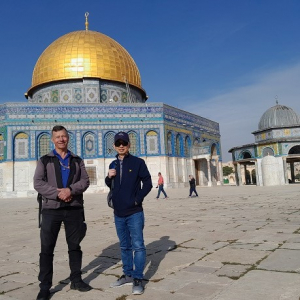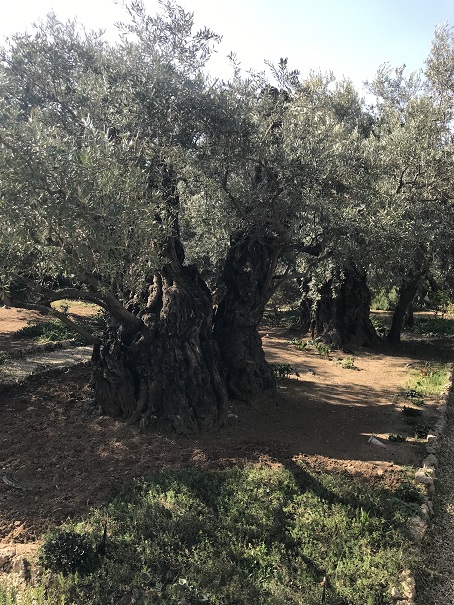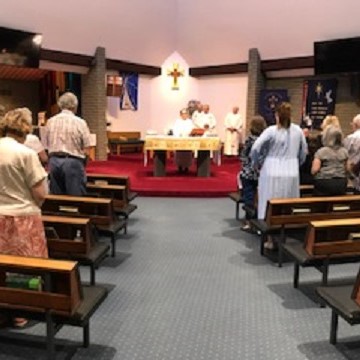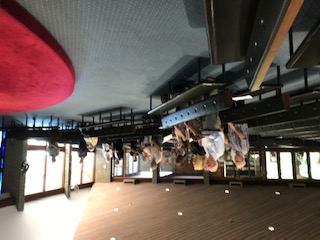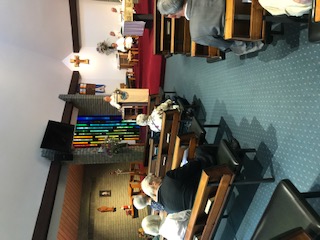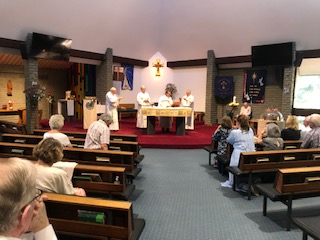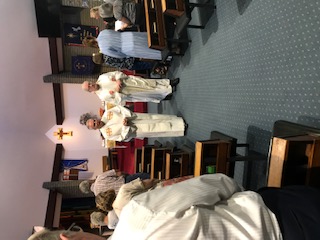Peter MALONE
A study tour in the Holy Land, Khoi and Mark Hanns
A study tour in the Holy Land, Khoi and Mark Hanns
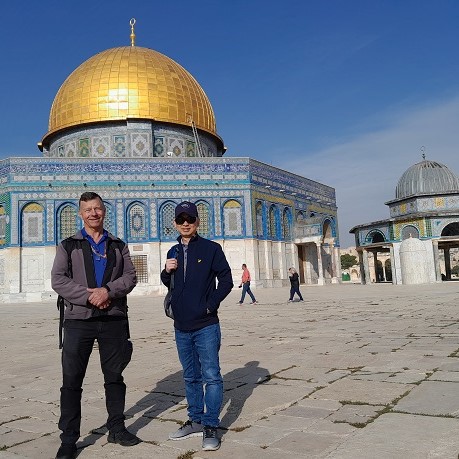
By Khoi Nguyen msc
This 2-week trip to the Holy Land was organised and architected by Dr Rosemary Canavan, a Scripture scholar at Catholic Theological College (University of Divinity, Melbourne). She was supposed to accompany us on this journey but a moment of falling while she was in the US broke her arm and made her uncapable to do this.
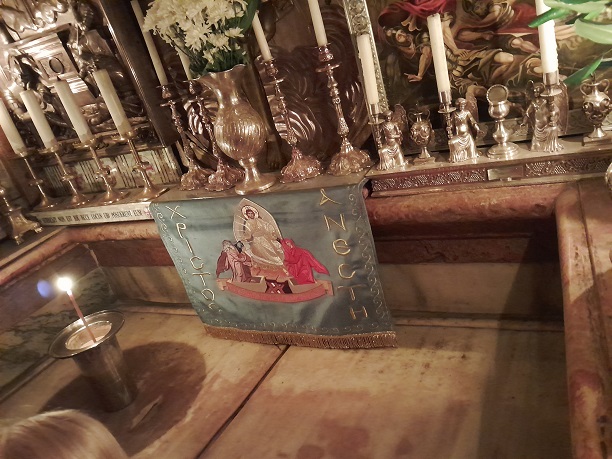
Mark Walsh stepped in as a replacement to be the tour leader. Mark brought with him his experience living in Jerusalem during his theological training and studies and his knowledge of Scripture and prayerfulness were incredible. Mark also works as a lay formator for the Sisters of Zion.
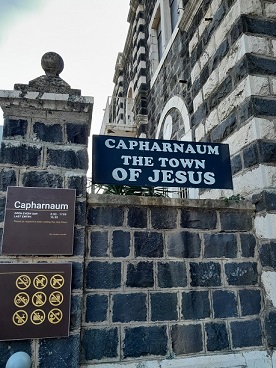
During these two weeks, Mark Hanns and I, along with 24 other pilgrims, visited and prayed at various places mentioned in the Gospel of Luke. For the first five days, we stayed at Nof Ginosar kibbutz, visiting Capernaum, walking along the sea of Galilee (or the lake of Gennesaret as Luke called it), Chorazin, the Mount of Beatitudes, having a boat ride on the sea of Galilee, visiting the museum which holds a first-century fishing boat discovered in 1986 around the local region, having lunch with St Peter’s fish, going up to Mount Tabor (the Mount of Transfiguration),
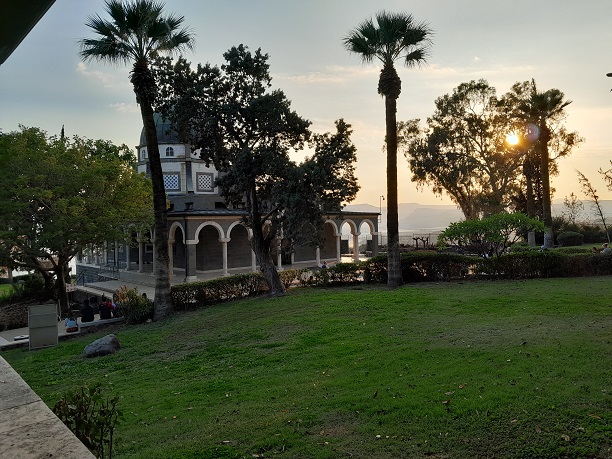
visiting Nazareth, Bethsaida, the ancient city of Dan, Magdala, Jordan river (where Mark was doing baptismal renewal for some of the fellow pilgrims), the first Church of the Ascension. From the sixth day onwards, we resided at Olive Tree Hotel, and from here we continue to explore the southern region of the Land where Jesus would have walked, especially the city of Jerusalem. We went to the Mount of Olives, visited and celebrated mass at the Garden of Gethsemane, walked via Kidron Valley to the Church of the Cock Crow.
The next few days we walked through the Western Wall tunnel, visited the place of the Sisters of Zion in Jerusalem, Ecce Homo, prayed at the Western Wall, visited Bethlehem, celebrated mass in a cave at Shepherd’s field, went to the Greek Orthodox Church of the Nativity, the Temple Mount, visited the Old City of David, the Church of the Holy Sepulchre, went to Qumran, the Dead Sea, visited a wilderness road of Jericho, saw the Mount of Temptation from a distance, Bethany, En Karim where John the Baptist was born, visited the church of Visitation, and concluding our trip at Emmaus, where the two disciples encountered the Risen Christ.
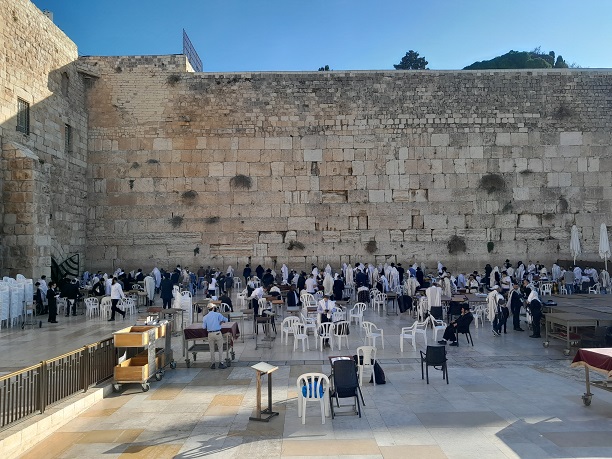
I think you can easily have a sense that this was a very intense trip with lots of information given us at each site and place by our excellent tour guide, Gila, lots of emotional moments as we were there, where Jesus had been, and listening to the Gospel readings again where it actually took place. These were quite expected.
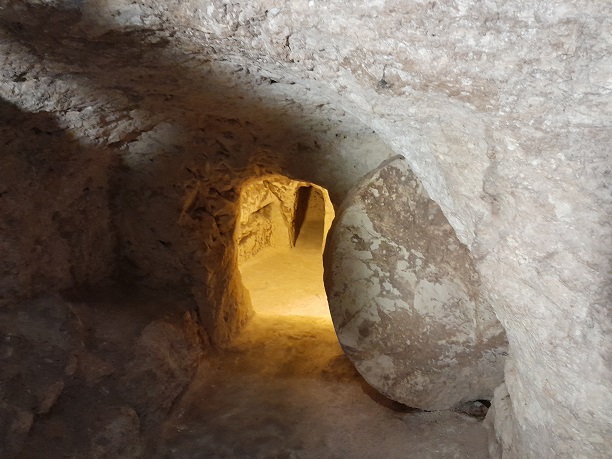
But what was not expected for me was the friendship, the humanity, the fellowship we experienced along the journey. We made friends with one another, we got to know one another better, we helped one another to get through uneven roads, narrow alleys and tunnels, rough places that were not so kind to our tiredness of each day. We even came to aid when one of us got conned and scammed by a shopkeeper!
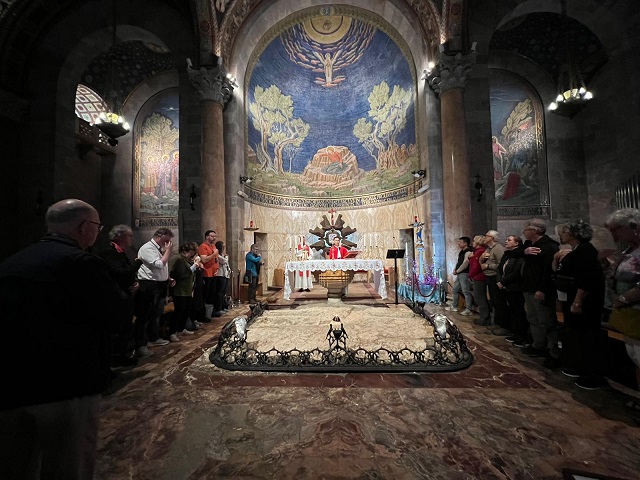
It was a memorable, amazing and intense trip we shared together. Thanks to Mark Hanns, who was my company, and to those who made this possible, especially Chris McPhee, who allowed and supported this journey, through and through.
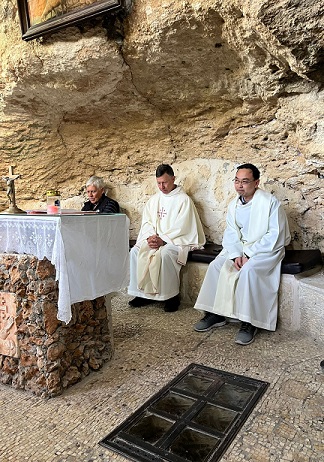
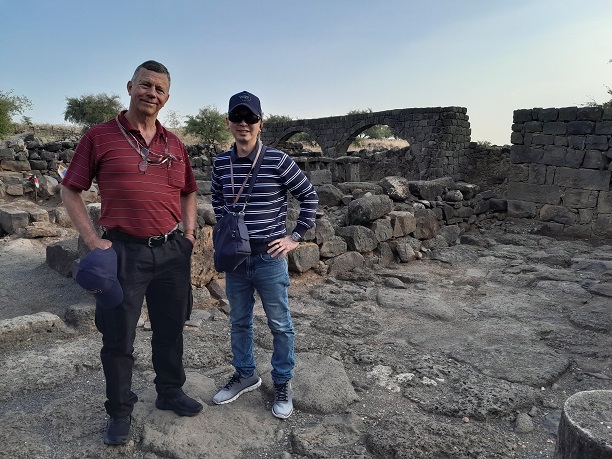
Ruido/ Noise
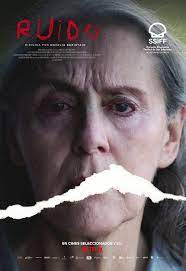
RUIDO/NOISE
Mexico/ Argentina, 2022, 105 minutes, Colour.
Julieta Egurrola, Teresa Ruiz, Adrian Vasquez.
Directed by Natalia Beristain.
The title is symbolic. The central character, Julia, has noises ringing in her ear, disturbing, images of her out in the countryside and the reverberations. However, there is a great deal of noise in this film, the demonstrations, the protesters, all seeking family relations who have disappeared, cannot be found, police inactivity, accusations of government connivance.
This is a very intense film, perhaps preaching to the converted, but hopes that it will raise consciousness, especially in Latin America, more particularly Mexico with the story is set, focusing on the number of men women and children who disappear, final statistics indicate more than 90,000 in recent years (with some pictures and incantations of their names during the final credits). The film itself is a demonstration, a protest.
The film opens with a long close-up of Julia, her getting up to face the day, the grief at the disappearance of her daughter nine months earlier, she and her husband invited to identify a body in the morgue, Julia upset with the seeming lack of interest and incompetence of the police. Later, she will visit her husband, he grieving intensely, depressed, and she irritated with him because of his concern about her when she wants to stay gripped by her grief. There are also telephone calls with her son.
The film uses close-ups and extreme close-ups to great effect, looking through faces into interior lives.
Julia goes to meetings of groups of women, listens to a long talk by her mother whose twin daughter has disappeared and the other twin is pregnant. At the meeting, a journalist, Abril is introduced and Julia has a meeting with her, giving her information about her daughter, last seen on holidays with friends, sending a video of the happy times. There are various episodes which follow, dealings with a commander, female, who takes a payment, but is wary about a woman going to areas controlled by men. There is a visit to an abandoned truck full of dead bodies, migrants. There is work in the fields with a group of women (actual searchers rather than actresses) out in the fields, looking for evidence, remnants, Julia herself being lowered into an underground caverns searching.
Abril is also able to take Julia to a powerful lawyer, Cassandra, but who is guarded at meetings by armed people for security.
There is a crisis when a bus is stopped in the night and Abril is abducted – never seen again.
Which leads to Julia going back to the city, seeing the demonstrations, lively, dancing, shouting, singing, masks, placards, Latin American verve. She encounters a young woman she had met earlier, a moment of support. Julia, who is an artist, and embroiderer, is able to pin a cloth with her daughter’s image on a clothesline along with other images and protests. But, bewildered, she is hit by the brutal police – and a final scene, back in the open country, her daughter revealing herself, and the sadness that the only way the two will be reunited is in the afterlife.
- The title, for Julia, as a symbol for the theme of the film, issues, protest?
- The Mexican setting, contemporary, cities, country towns, open country, homes, public areas, police headquarters, abandoned buildings…? Authentic? The musical score?
- The strong social and political stances of the screenplay? Disappearances in Mexico? The cartels, human trafficking? Government attitudes? Police attitudes and inaction? The protest sequences and their vehemence, the women, feminism, the film as a protest?
- Julia, audiences identifying with her, the opening, the focus on her face, the continued use of close-ups throughout the film, for Julia, extreme close-ups, four of the characters, the conversations, for reactions?
- Julia and her background, artist, embroidery, exhibitions, the studio, management? Her relationship with her husband, with her daughter, with her son? The impact of her daughter’s disappearance, nine months, the consequences for her and her preoccupation with grief, her husband and his grief, immobility, wishing to die, and Julia’s irritation with him for his trying to help her? The phone calls with her son and her wanting to protect him? And the video of her daughter, on holidays, with her friends, the final words?
- Julia and her husband, going to the police, to identify the body, not their daughter’s body? The new, third, man in charge? Attitude towards the police, action and inaction? Rodriguez, his attempts to help? His later appearance, helping Julia, warning her about dangers?
- Julia, her age, experience, appearance, getting the tattoo in honour of her daughter, the visit to her husband and his lonely grieving, by himself? Her going to the group meetings, the women telling their stories, the long close-up of the woman, the disappearance of her twin daughter, the other daughter pregnant, the effect?
- Abril, journalist, present at the meeting, meeting with Julia, bringing her daughter, Julia questioning her about her motivations, her concern for her daughter? Her character, age, accompanying Julia, in the bus, to the abandoned area, the meeting with Cassandra, the police guards and security? Bringing home to Julia the seriousness of the cases? Promise to help?
- Julia joining the groups of women out in the fields, their commitment to the search, over many years, their backgrounds (and their being actual searches rather than actresses)? Julia being lowered down into the confined space, her search?
- The local commander, policewoman, tough, the money? Taking her to the truck, the truck full of bodies, the dead migrants? The effect on Julia, the smell on her clothes? Yet continuing?
- Julia’s commitment, travelling, her reactions, irritable, grieving?
- The episode at the protest, the young woman, their talking, bonding? At the later protest, the young woman there again, Julia embracing her?
- The bus, the abduction of Abril, and her not being seen again?
- Julia, in the city, the demonstrations, the protesters, songs, marching, shouting, slogans, emblems? Julia and her bewilderment, her putting the embroidery of her daughter on the clothesline? Continuing to wander, going upstairs, the confusion, the police invading, the young women taken away, the brutality towards the women? Julia being hit and collapsing?
- The motif throughout the film of Julia, the long shot in the countryside? The return? Her daughter’s appearance, the mask, revealing herself? That Julia and her daughter could be reunited only in their deaths?
Half Brothers
HALF BROTHERS
US, 2020, 96 minutes, Colour.
Luis Gerardo Mendez, Conor Del Rio, Vincent Spano, José Zuniga, Juan Pablo Espinosa.
Directed by Luke Greenfield.
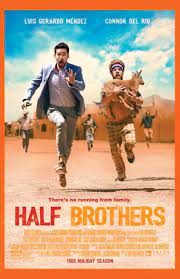 This is one of those films where it may be important for a reviewer to say: don’t give up too soon, persevere, there is a lot more in this film than you might expect.
This is one of those films where it may be important for a reviewer to say: don’t give up too soon, persevere, there is a lot more in this film than you might expect.
The film has many comic elements, farcical elements. However, it also focuses on social issues, especially the images of Mexico and the United States in the eyes of each character. There is the importance of poverty in Mexico, migrations, the exploitation of Mexicans in dirty and menial work, opportunities and lack of opportunities – and with a great deal of visual and verbal comment about the eccentricities of Americans, their appearance, manners, sense of superiority. (Most of the bloggers are very favourable to the film, enjoying the characters, enjoying the comedy, noting the social concerns – but most of those against the film are Americans who resent the satire on the American image.)
The film has the advantage of effective performances, the characters creating their roles, some stereotyping breaking through, the central character, Renato, played by Mexican star, Luis Gerardo Mendez, humourless, uptight, resentful of his father abandoned him and going to America. He discovers his half-brother, Asher, played by comedian, Conor Del Rio, incorporating all the behaviour, looks and clothes, music, of the undisciplined free spirit. There will be clashes between the two on the journey that they make from Chicago to Mexico, but each of them having to change somewhat and bonding.
The film opens in Mexico, a family, little Renato, love for his parents, his devoted father, flying model planes. However, poverty, his father leaving for the US, some phone calls, but never returning, Renato growing up resentful, but successful in his own right. He is about to marry, his fiancee having a son who is very eccentric, bullied at school, wearing masks (even Hannibal Lecter) around the house. A challenge to Renato.
But the bulk of the story is his being called to the deathbed of his dying father in Chicago, his being unwilling, further resentment towards his father, the mystery of his not coming back to Mexico as promised, and, of all things, finding that the young man with whom he clashed at the diner is his half brother! The father has always love puzzles and so (audiences tossing this kind of credibility to the wind and accepting it) the two brothers go on a journey to find out the truth about their father, a road movie with all kinds of digressions.
There are envelopes with messages, finding a friend of their father who begins to explain what happened when he was in the US, than a pawn ticket for a wedding ring and the explanations from another friend, some of the tragic events that befell the father, then a decision to visit a convent where there is also a message, Eloise, and the finding of a video from their father, building up to sad memories of what happened to him, his attempts to return to Mexico, bashed and robbed, the birth of Asher and his decision, phoning his wife in Mexico and Renato refusing to talk to him, the decision to stay in America.
And, to the credibility/in credibility of the plot, the father has left a plane with Renato’s name – so that they can get to the wedding on time after flying over the beautiful Canyon Renato had always wanted to fly over with his father.
There are a lot of funny moments, more successful than might have been anticipated. And, perhaps, there may also be some tears at the end.
- The title? Expectations? Serious? Comic?
- The tone of the film, comic aspects, farcical aspects, serious aspects, emotional aspects? Combined?
- The background social issues, life and work in the Mexican village, the need for migration, going to the US, people trapped in the US, people abandoning life in Mexico and connections? The image of the Americans, the dialogue, satirical comment, images? The hard work for migrants, opportunities for development? The American Mexican border, border guards, treatment of migrants?
- The introduction to Renato, his age, the images of the gliding planes, with his father, the bond between father and son? his mother? The happy life? His father, work, money, the decision to go to the US, the farewell, the promises, Renato taking it all seriously, treasuring the model plane, the later phone calls, Renato and his disappointment, his father phoning his mother, his cutting off his father, growing up resentful?
- Renato in his 20s, successful business, engineer, skills, engaged, his fiancee, the plans for the wedding, her guests, his having no friends? Uptight? No humour? His fiancee and her son, odd, the masks and his wearing them all the time, ridiculed at school, even Hannibal Lecter? His mother wanting Renato to bond with him, Renato’s attempted talking, failing?
- The message from his father, his being unwilling to go, his fiancee persuading him? Flying to the US, his father in hospital? The initial encounter with Asher, the dispute at the diner, Asher, clothes, hair, rather wild, eccentric, the clash with Renato? The revelation that his father had another son, Asher’s arrival, Renato and his disbelief? Not being able to farewell his father? His father’s death?
- Renato and his father, love of puzzles and riddles, the credibility of his father’s elaborate setup for the search? It not mattering about this credibility but, rather, the audience accompanying the two men on the search?
- The flashbacks and the accumulation of the story? Flavio, arrival in the US, the literal dirty work, the factory, drawing on his engineering skills, developing new techniques for the plains, the support of Katherine? The relationship with her? The birth of Asher? Renato, going to the factory, his being overwhelmed by his father’s inventions and inventiveness?
- The pressure of the wedding, on-screen notices of how many days to the wedding…? And Renato’s journey, side journeys, to get back to Mexico?
- Flavio’s device, the journey for his sons, to go together? Renato serious, uptight, appalled at Asher and his behaviour, appearance, music, and the episode of the taking of the goat, the goat accompanying them on the trip?
- The various envelopes, the destinations? Finding Evaristo? Evaristo and his friendship with Flavio, filling out the background of Flavio’s time in the US, hardships? The decision to try to find Mr B, the clue of the wedding ring and the box number, the finding him, his explanations and further aspects of Flavio’s story, the importance of the flashbacks to what happened to Flavio?
- Flavio, the relationship with Katherine, but his decision to return to Mexico, the trip to the border, pay for the ticket, his being ambushed and robbed, clothing and money, the ticket taken? Prison, harsh, the guards leaving him on the road? His returning to Mr B, pawning his ring and the plan for him to keep the ring until his son came?
- The ups and downs of the relationship between the two sons, gradual understanding, the beginnings of bonding? Audience attitude towards each of them, citing more with Renato, critical of Asher and his erratic behaviour? Renato continuing to travel, the car, the goat, the music, getting out, their fights, wrestling on the ground? And then Renato coming back, supportive of Asher?
- Renato, the arrest, in the cell with the refugees?
- The rednecks, the taking of the goat, bashing Asher, Renato’s return? Running out of petrol, Asher having supply, the goat having chewed through the containers and spilling the petrol? Going to the house, the ethanol, producing it for the journey, their being overwhelmed by the gas, erratic behaviour?
- The rednecks, the plan, the ethanol into their building, their being overcome and collapsing, taking the goat, driving, the detour to the convent and the clue, Eloise?
- The convent, the nuns, the safe, trying birthday clues to open the safe, Eloise turned upside down and the revelation of the code, discovering the video?
- The importance of the video, Flavio and his sincerity, always being a genial personality, explaining the situation, helped at the convent, the phone call to his wife in Mexico, the message about the birth of Asher and his need, his making the choice, Renato seen as refusing to talk to his father, his mother’s sadness? Flavio and his choice?
- The nuns taking the brothers to the building by Flavio, and the plane with his name on it?
- Flying to Mexico, flying over the beautiful Canyon that Renato had always wanted to see with his father, the wedding, and the eccentric young son and Renato having learnt through Asher, bonding with the boy?
- An amusing road film, comic in farcical elements, laughter, sentiment, the mellowing of the uptight son, some responsibility with the eccentric son – all in the context of US-Mexico and social issues.
Farha
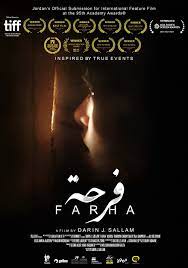
FARHA
Jordan, 2021, 93 minutes, Colour.
Karam Taher, Ashraf Barhom, Ali Suliman, Tala Gammoh.
Directed by Darin J. Sallam.
Nakba is an Arabic word meaning “catastrophe” and refers to Israel's ethnic cleansing of Palestine, its exiling of Palestinians and making them into refugees, its dispossession of Palestinian property, its destruction of Palestinian cities, towns, and villages, and its attempt to erase the existence of the Palestinian ...
Farha the name of a young girl in a Palestinian village, 1948. There are scenes of the British occupation withdrawing – and children throwing stones of the British soldiers. There are happy sequences in the village, especially meetings for marriage arrangements, preparations for marriage. However, Farha wants to study, to go to the city, her father, the mayor of the town, eventually agreeing.
But, it is 1948, the time of the catastrophe for Palestinians, the setting up of the state of Israel, the troops moving into the villages, attacking the local citizens, ousting them, some massacres (the theme of the Israeli film, the documentary about the issues and events in this film, Tantura). It can be noted that Israeli authorities wanted this film to be removed from Netflix and impose some bands on the screening of Tantura, even though it is an Israeli production.
The rest of the film is quite harrowing, her father having to go off with the invading Israelis but promising to return. To safeguard his daughter, he locks her in a store room where she spends several days, surviving, anxious, wanting her father. The film is quite powerful in this presentation of a girl surviving in this confined space.
But, before her father returns, a family arrive, the mother about to give birth, seeking refuge in the house, Farha observing through a hole in the wall, the shooting of the father, the mother giving birth and her child, the mother killed, the baby exposed and dying, the callousness of the Israeli commander, the misgivings of one of the soldiers but the killing of the child.
Eventually, her father returns, Farha getting out of the store room – but her life changed, her escaping to Syria, her witnessing to these events over the many decades.
- The title and focus? The young girl, Palestinian, hopes, sad experiences?
- 1948, the situation in Palestine, the retreat of the British (and the glimpse of the boys throwing stones at the jeeps and wishing them gone)? The Israelis? The state of Israel? The Nakba, the catastrophe from the Palestinian point of view?
- Israel wanting this film to be removed from Netflix? As well as Farha, this film is really a film about the Nakba?
- Audience interest in, sympathies for the Palestinians, for the state of Israel? The subsequent conflicts, the possibility of a one state?
- The setting, the village, the greenery, the children, at play, the homes, Farha and Farida, the differences between living in the village and the city, Farha and her hopes for education, in the city, her father’s reaction, her stepmother travelling away, the prospect of the suitor, the meetings with him in the family, Farha not wanting to marry him? And the background of the girl from the village and the preparations and celebrations for the marriage?
- The prospect of the Israeli invasion of the village, apprehensions, preparations? Explosions and the coming forces?
- The father, Mayor of the town, his devotion to his daughter, his agreeing that she should go to the city for studies, the documents? Her being overjoyed?
- The coming of the Israelis, the dangers, for reader and her father going to the city, her father urging Fahra to go with them, in the car, getting out, wanting to stay with him? The dangers?
- His having to go, the visits from the other mayors and authorities, his duties? His putting Fahra in the storeroom? Promising to return?
- The bulk of the film with Farha in the storeroom, the visuals, locked in, light and dark, the hole in the wall, food, the rain and drinking water, sleeping, toilet, the days passing? Her anxiety? Hopes seemingly dashed?
- The arrival of the man and his family, the pregnant wife, her giving birth there? The troops, hiding with the baby on the roof? The Israeli commander, the young soldiers, male and female? Her father coming, the bag over his head, his trying to mediate, his concern about Farha, reassuring her, leaving? The confrontation with the man, searching him, suspicion of weapons, that the house had weapons? The wife and baby coming down? The dialogue, the shooting of the husband? The wife and children lining up? The shooting? The issue of the baby, the soldier to stamp on its head, his inability to do so? Leaving the baby, its dying from exposure?
- Farha watching all this through the whole, aghast, the baby? Her trying to break the door down? Finding the revolver, shooting the lock, getting out, the baby? Dead?
- Epilogue, her surviving, going to Syria, keeping alive her witnessing this episode? Seeing it again over 70 years later?
Remembering Tony Young, Memorial Mass, Blackburn.
Remembering Tony Young, Memorial Mass, Blackburn
With the sudden death of Tony in PNG and plans for him to be buried there, Brian Gallagher organised a Mass at St Thomas, Blackburn, on Wednesday, January 10th – for MSC Confreres, for Tony’s close family and family friends.
Russell Andersen was visiting Melbourne from Eastern Papua and presided at the Mass. Present was Michael Sims who spent many years in Eastern Papua as well as Chris McPhee, Provincial. Brian Gallagher gave a eulogy. Other MSC present, Paul Castley, Alo Lamere, Philip Malone, Peter Malone, Peter Curry. Robyn Reynolds represented the OLSH, Carmel Slattery the MSC Sisters, also present Madeleine Barlow RNDM and Mary Andersen LCM.
A family eulogy was given by Jo, Tony’s sister on behalf of Tony’ sisters and brothers who were present with their families. Jo spoke very personally about Tony (Anthony in the family and, sometimes, Ant). She also spoke about his work for Hope Academy, ambitions for online education opportunities for the young (the ‘offcuts’ as they were named), reading texts from Tony’s writing about his aims and hopes.

After the Mass, the MSC gathered at Cuskelly House for a sharing of memories – mission commitment, spirituality, as well as humorous anecdotes of absentmindedness. We were thankful for his selfless 60 years of mission commitment and his always being a friendly confrere.
(There were unexpected difficulties with the camera, so disappointing photos of less quality. But, two better group photos, see at the end of the eulogy.)
Eulogy for Tony Young,
Brian Gallagher MSC
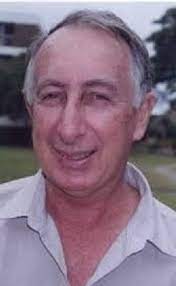
We all know – and doubtless, will hear more – of Tony’s extraordinary missionary work in Papua New Guinea – for almost all of the 60 years of his priesthood – in Nimowa, one of the eastern-most island of Papua New Guinea and in recent years at the Hope Academy in Alotau. I would like to speak, rather, of the man himself, Tony Young, that quiet, slow moving, thoughtful, prayerful, forgetful, beautifully loving and caring man of God, a Missionary of the Sacred Heart to his very bones.
We are blessed that many of Tony’s family are here, his sisters Mary, Win and Jo and his brother Bill, and some of their families… they know the man maybe better than any of us. We offer you our sympathy on Tony’s death and we are glad to join you now in prayer. We are blessed, too, that our celebrant Russ Andersen has also been a missionary in Eastern Papua, I guess for as many years as Tony. And Michael Sims, too, ministered in that mission – he was parish priest of Rossel Island when Tony was parish priest in Nimowa. They were neighbours! Maybe only a full day away in the boat.
Tony Young has ended his earthly pilgrimage and it is our privilege to accompany him with our prayers and our love as he now comes into the presence of the God he loved with all his heart. We know of Tony’s profound love of God because he has loved us in the same way – possible for him because he knew in his own heart how loved he was himself – by God and by many many people here and in PNG. That love is captured in the Gospel reading today: Love one another – as I have loved you. In our love for others, we spread God’s love in our world. This is the spirituality of the heart, the spirituality that Tony lived effortlessly. I’ve called him a Missionary of the Sacred Heart in his bones. I doubt that Tony ever said a bad word about anyone. He was simply a loving man.
When Tony was a young man, preparing for priesthood in the seminary in Croydon, he took to heart a hymn sung often in MSC circles called Divine Love in a Human Heart. Written by the Australian composer Janes McAuley. Some of McAuley’s words echo in me as I think about Tony:
Jesus in your heart we find love of the Father and mankind.
These two loves to us impart divine love in a human heart.
Tony, our brother Missionary of the Sacred Heart, our friend, our companion on the journey made these words real in the lives of countless people.
Our first reading, chosen by Tony’s sister Jo and read by his brother-in-law John, is Tony Young to a tee: a servant of God, in whom God delights, chosen and imbued with God’s spirit.
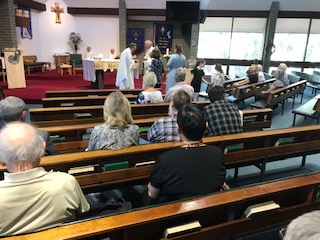
I think Tony knew, deep down, that he was chosen, that he had a unique call to love, to bring healing, to work for justice for God’s people. But he didn’t talk about it. He would talk easily of the people he cared for and ministered to, but he rarely spoke about himself. Tony was quite a humble man.
WE know that Tony could be quite vague, almost dreamy, as though his mind was working elsewhere even when he was with you. Years ago, Tony decided to surprise his parents by coming home for their golden jubilee of marriage. He walked into the house, all smiles ‘surprise, surprise, happy anniversary.’ ‘Ah, Tony, you are 12 months early!’ He came to me after that and asked could I give him a job at Heart of Life – he needed to justify his being in Melbourne!
Our friendship grew around that time. Tony never failed to visit whenever he was home on leave, often spending a few days with me. This was especially so when I was living in Shoreham. Tony loved Shoreham and had a few friends there – stemming from the days when the students from Croydon seminary holidayed there annually. At one point, he vaguely thought of retiring to Shoreham, but the pull of Papua New Guinea and his people there was too strong. Later when I had retired, I even suggested to Tony that it might be time for him to retire – we could live together in Blackburn. Thankyou, but no thankyou. The pull of Papua New Guinea was too strong. On his visits, Tony always seemed anxious to get back to his mission. Her is there, still. Tony would not be unhappy to have died in PNG, and at his request, he will be buried there.
Mentioning Shoreham, as a student, Tony painted a beautiful watercolour of Honeysuckle Bay and the pines down in front of our house there. He left it with his mother and discovered it only after Mary died maybe fifty years later. Warren recalled their going to a second-hand dealer to find a suitable frame. After framing, Tony brought the painting to Shoreham to present it to me. It hung in my house there for years, and now hangs happily in my house here. Just another of Tony’s gifts. I think he knew that, too, but again he didn’t talk about it. He just thought I might like it. I do.
Tony, you have lived your life with great love and loyalty. You loved and were loved by your family, by your brother MSCs, and by the thousands of people whose lives touched yours. We rejoice that, through you, we have known the love of the Father and humankind. You have lived these two loves generously and unwaveringly. We are gifted and honoured for you have shown us the beauty and the wonder of divine love in a human heart. Now, with God, you know divine love in all its fullness. In the words of Gustav Mahler’s Resurrection Symphony, ‘what you have longed for is yours.’
Rest, dear friend, in God’s loving embrace.
And the group at Cuskelly House – the photographer told us to look happier, but we were looking at the Provincial!
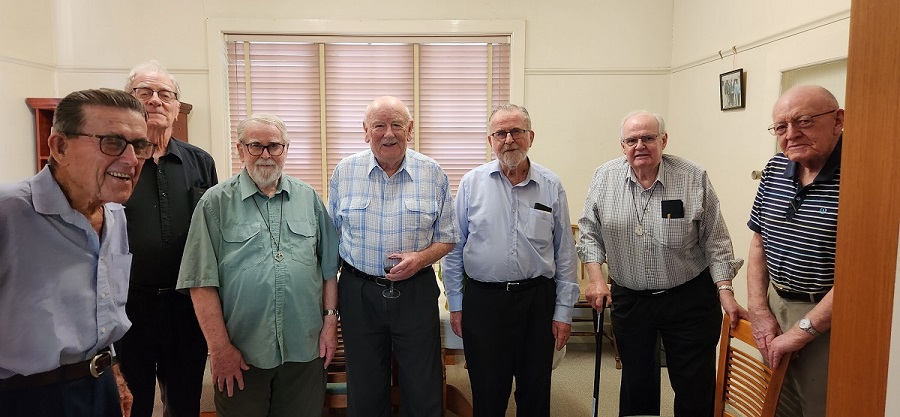
So a photo with him in it!
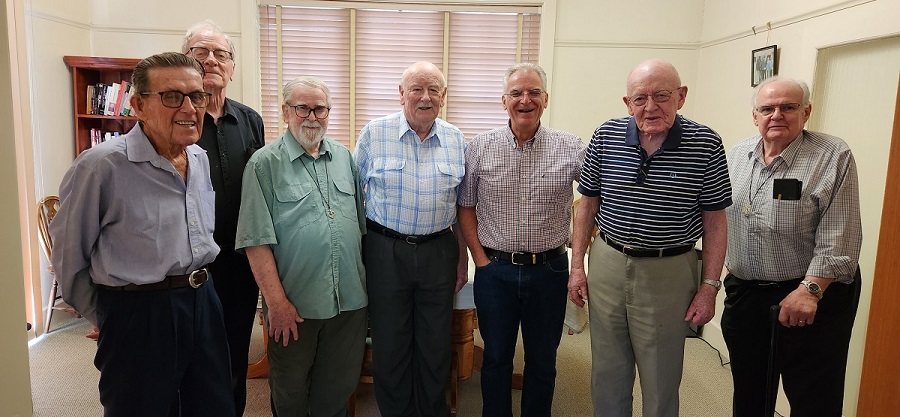
Operation Fortune. Ruse de Guerre
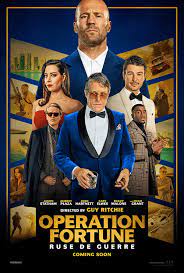
OPERATION FORTUNE: RUSE DE GUERRE
UK/US, 2022, 114 minutes, Colour.
Jason Statham, Aubrey Plaza, Hugh Grant, Josh Hartnett, Cay Elwes, Eddie Marsan, Max Beasley, Peter Ferdinando, Bugzy Malone.
Directed by Guy Ritchie.
The Fortune of the title is Orson Fortune, the espionage agent the British government goes to whenever there is a top job, undercover, no holds barred, deceptions in war – ruse de guerre. He is played by Jason Statham, who has worked with director Guy Ritchie for over 20 years, always the tough guy, never smiling but with a wry sense of humour, more ironic than funny, just some minor variations on the same performance. And audiences have liked him – and he won’t lose any fans because of this film.
Guy Ritchie has directed quite a variety of films over the decades, Disney with Aladdin, two Sherlock Holmes stories with Robert Downey Jr and Jude Law, and plenty of action and gangster films, especially, more recently, The Gentleman. With this film, he combines quite a lot of action, with some spry dialogue, some intricate plot developments, which keeps the attention and carries the audience along in a rollicking kind of way.
The British government is represented by Cary Elwes, a solid British character after his years in America, the head of secret operations, called in by the head of Department, Eddie Marsan. Something very secret, something very valuable, is on the illicit market, a number of international bidders, and a wealthy go-between. Hugh Grant made quite an impression in The Gentleman, playing against his generally accepted type, the uppercrust Englishman. Here he has an even better opportunity to go against image he gives a very entertaining performance as a genial crook, wealthy with his yacht in Cannes, and Grant using a Michael Caine accent to great effect. He is also obsessed with an action film star, Danny Francesco, played very effectively, often dumb, often shrewd when it comes to his furthering his career, by Josh Hartnett.
In the meantime, Orson Fortune is given his backup, Sarah from the US, an absolute genius with high-tech, played by Aubrey Plaza (who has been up and coming for several years in a variety of roles, always aggressive, frequently abrasive, White Lotus 2) and a rather quieter, behind-the-scenes shooter, rapper, Bugzy Malone (no rapping here, rather surveillance advice and some accurate shooting).
And, scenic treats for the audience, sober London, action at Madrid airport, visit to Los Angeles and Hollywood set, the yacht at Cannes, a lot of the action and climaxes taking place in Turkey, and a visit to Doha.
The screenplay keeps up the action throughout, never a doubt that Orson Fortune will win any fight that he is in – and that’s quite a few. But, undercover spies and agents are not like they used to be in the films of the past. We are in a high-tech world, hacking into every computer system possible, always surveillance and visual coverage of every situation, and, each character with an earpiece, not only able to communicate but also to warn about any attackers try to creep up secretly…
So, serious stuff with Jason Statham. Intellectual stuff plus quite a lot of glamour with Aubrey Plaza. A whole lot of international villains, many from Ukraine (pre-war), and some Americans allegedly involved in a charity for orphans, and Hugh Grant with his obsession for the action hero, joining in the finale as if he were performing in an action film – and he is.
Not an arthouse show – but enjoyable entertainment.
- Popular entertainment? Action show? Ironic comedy? The work of Guy Ritchie? His working with Jason Statham? With Hugh Grant? The combination working well?
- Audiences enjoying espionage, undercover agents, international plots, villains, financial deals, betrayals?
- The credibility of the plot, heightened characters and details, the deal for The Handle, the secrecy, the dealers, the customers, the British government? The spies going into action, detection, surveillance, fights, plans and disguises, over the top?
- Audiences enjoying the locations, London, the British government, the Madrid airport and the action, Los Angeles, the film set, the yacht, Cannes, the extensive sequences in Turkey, beauty, local colour, the finale in Doha? The musical score?
- The introduction in tone, the heavy footsteps, Nathan in the corridors of power, the discussions with Norman, the situation, the British government, separate entities not communicating, the government in the situation, trying to find out what was being sold, Nathan and his reputation for controlling operations, the decision to hire Orson, revelations about Mike and his alternate squad, changes in loyalty?
- The operation at Madrid airport, surveillance, the addition of Sara and JJ to Orson’s team, Orson, the discussions with Nathan, issues of holidays, money, expenses, wine…? His agreeing to lead the operation, the tactics at Madrid airport, surveillance, communications with the group, the carrier, his heart turn, Mike and his agents and the taking of The Handle?
- Jason Statham as Orson, variations on the same performance, his screen presence, serious, wry humour, action, the many fights? The introduction of Sara, American background, strong personality, aggressive and abrasive, her technical skills, with computers, hacking, connecting, surveillance, communicating information? JJ, past member of the team, skill with guns? At Madrid airport? Orson liking being well paid, the high life, private jets…?
- Gregory Simmonds, Hugh Grant’s entertaining performance? Accent? Criminal? Movie devotee, Danny Francesco, obsession with him? The key to the plan? The group going to Los Angeles, the posters for Danny Francesco, the film set, Danny, performance, stand ins, stunts, his prima donna behaviour? The group watching him, approaching him, wanting to use him as bait, the discussions, persuasion, that he should act as himself, and the group going to the yacht?
- The scenes on the yacht, Gregory, delighted to have Danny on board, the conversations, Gregory’s enthusiasms? The function on the yacht, raising money for orphans? The two international dealers – and the later being revealed as the buyers? Other representatives, Ukrainians? Yet everybody wanting to have a selfie with Danny? Movie awe? Danny, nervous at first, getting into the swing of things, his performance as himself? Orson posing as the agent? Sarah posing as the girlfriend? Her glamour, dresses, manner? Yet the work behind-the-scenes, checking the computers, clashes with Gregory’s men, Orson fighting with the Asian man and pushing him overboard? The success of ingratiating themselves with Gregory?
- The invitation to Danny and his girlfriend to spend the weekend in Turkey, the team going to Turkey, Gregory and the setting up of the meetings, the British lawyer and his presence, Ukrainians? Meetings and deals?
- The action in Turkey, the surveillance, Sarah and her access, even to changing Orson’s voice to that of the lawyer? The meetings, the signing of the contract, the money going through, then its immediate disappearance? Upsets, the lawyer in the street, his death falling over the tower? Orson and the many fights? The timing, Gregory and his associates suspicious, the timing for the escape – and the background of Gregory and his infatuation with Danny, buying the jewellery on the yacht, the money, and giving him his favourite car, driving with him? The car and the escape? Car pursuits, dangers? JJ and his surveillance advice, accuracy in shooting?
- The nature of The Handle, IT, causing banking chaos throughout the world, the two planning to buy? Orson overcoming them? The shootouts and the body count?
- The plan for Gregory, he is enjoying participating in the plot, as if he is acting in the film?
- The finale, mission accomplished, the dealings with Nathan throughout and his supervision? The confrontation with Mike in the finale?
- Gregory and Danny, in Hollywood, the infatuation, working in the movies?
Alleys, The

THE ALLEYS
Jordan, 2021, 116 minutes, Colour.
Emad Azmi, Baraka Rahmani, Monzer Reyahnah, Nadira Omran, Maisa Abd Elhadi, Eslam Al-Awadi.
Directed by Bassell Ghandour.
Audiences do not have many opportunities to see films from Jordan. However, Netflix is providing films from such countries, especially from the Middle East.
This is a kind of underbelly story, as the title indicates, a focus on families and characters who live in the alleys of the city. There is a voice-over at the beginning, explaining how people chat, gossip, how the stories become embroidered as they are passed from one to the other – and, one of the pleasures of the film is to discover who the narrator is by the end of the film and his contribution to the plot developments.
The film is divided into five chapters pinpointing the behaviour of the characters and the final, everything in place, checkmate solution. However, it does something with his central character as Hitchcock did with Psycho, the central character dies two thirds of the way through the film – though his character is important even after his death and what happens to his body.
The first chapter of the film is called Hustle, focusing on Ali, young man about town, pretending that he is employed by an American firm and is to be transferred to Istanbul while all the time he hustles wealthy guests from an upmarket hotel, employees conniving with him, then taking them to a nightclub who spend big and he gets a commission. However, all the clubs and businesses have to pay protection money to the local boss, Abbas, and his former prostitute associate, the tough-minded, Hanida. Ali is also involved with the daughter of the local hairdresser, Lana.
But, there is a blackmailer in the vicinity who film is compromising situations on his phone, then sending the information and demanding money – which happens with some film of Lana and Ali together. Lana’s mother is upset (and there are flashbacks to her tough origins in setting up addresses shop with her ineffectual husband), starts to arrange a marriage for Lana.
As the plot thickens, Ali decides to Rob Abbas, is caught by him, overwhelms him, gets the safe combination, takes the money but brutally cuts up Abbas’ tongue.
And here is where the film becomes intriguing, Lana running away with Ali but discovering the truth, Ali coming with the money to entice her away but encountering Lana’s mother – leading to struggle, death, getting rid of the body, and the blackmailer filming it all and making more demands.
The sympathetic character in the film is Bahaa, Belize longtime friend and the local barber – who spends a lot of the latter part of the film trying to rehabilitate Ali’s reputation, finding out about the hustling at the hotel, arranging that friends would comfort the old grandfather and the family pretending they were from the American company, and organising Ali’s death as if it were a crash in a car and employing a detective to come again to console the family.
Final section, Checkmate, everybody settled once again, with holds over each other, and Lana gone with the money and setting up her own hairdressing business.
Intriguing, plenty of plot – especially even more plot in the latter part of the film.
- A film from Jordan? The film inviting the audience to come to the Jordanian city, the underbelly aspects of the city, the alleys, the apartments, clubs, the contrast with the fashionable hotels? An impression of Jordan?
- The structure of the film, the five sections, the different points of view, and checkmate at the end with everything brought together?
- The irony of the screenplay, the central character dying two thirds of the way through, yet his presence, dead, in the latter part of the film, governing characters’ behaviour?
- The introduction to Ali, age, his mother, brothers, devotion to his grandfather, helpless grandfather in the shop? Introduced with the title for the section, Hustle? His pretence at having a job, American company, talking English, this is part of his reputation? Seeing him in action at the hotel, the connections on the staff, guests, taking them to the club, hassling them, big spenders, and his getting the commission from the manager? Happy-go-lucky? The relationship with Lana? Her mot her? His close friendship with Bahaa, the barber, getting his face touched up? But his plans to change his life, perhaps go to Istanbul with Lana?
- Lana, a young woman in an open but protected society? Her mother, the flashbacks to her mother’s experience with men, the past, her husband, setting up the headdresses? Later, the workers, the clientele, the gossip? Protective of Lana? The plan for the arranged marriage, the family coming, the young man, polite, gifts to Lana? Yet her thinking of Ali?
- The narration, seemingly anonymous, talking about the town, the alleys, the gossip, the story is changing from person-to-person, this being visualised – and the final revelation that he was the photographer, blackmailing everyone, capitalising on secrecy and gossip?
- The images of Lana and Ali, together, the demand for money? The mother’s reaction, the visit from her husband, his being rather slow witted, her control of him, getting him involved in discovering who the blackmailer was?
- Abbas, the protection racket, his men, Hanida, the flashbacks to her background, prostitute, the advances of the man, her setting fire to him? Her control of Abbas’s business? Going the rounds, collecting the protection money? Ali, seeing where Abbas hid his money, his plan? The situation with Lana, Abbas and his protection, warning of Ali, Ali going to the club, the manager warning him off?
- The Istanbul plan, people believing it, the sequence of the robbery, Ali trying to open the safe, Abbas coming, tied up, the combination, getting the money, the vicious violence, cutting and Abbas’ tongue? The consequences for Abbas, Hanida sending the men away, covering for him, the changing loyalties of the men, Abbas reappearing, the disloyal men thrown over the building, honeyed are continuing the build business?
- Ali, lowering the telephone, Lana packing, joining Ali, the going to the hotel, her wariness, the truth about the American company, her discovering the money, leaving? Ali distraught, bringing her suitcase, lowering it to her window, the fact that Lana had not gone home but to a relative, her mother in the room, getting the money, waiting for Ali, with the scissors, the fight, killing him? Getting her husband, the blood, the carpet, the husband taking the body in the truck, getting rid of it by the highway? Burning the rug?
- The irony of the murder being filmed, the blackmail demand, the mother upset, the payment, the wrecked car, her husband watching, then losing the blackmailer? Lana returning home, her mother being forceful, getting her to stand at the window, the father observing, the blackmailer arriving, leaving, returning to watch Lana, his being captured, the revelation of who he was, the fact that he was doing this for so many people around the district? Their photographing him and the condition that there will be no revealing what it happened?
- Lana, overhearing everything, going to mother’s room, taking the money, disappearing?
- The behaviour of Bahaa, the long bond with Ali, wanting to save his reputation, going to the club, just drinking juice, but learning the truth from the manager? His organising his friends to pretend that they were the American company to reassure the family and the grandfather that all was well? His later organising the car, seeing at the hotel, its crashing, his employing them and to be the detective, to explain everything to the grandparents, the relief, and the celebration of the funeral?
- The checkmate ending, people with their comeuppance, people with their achievement, and Lana and her hairdressing business in the other part of the city?
Marcel, the Shell with Shoes on

MARCEL, THE SHELL WITH SHOES ON
US, 2021, 90 minutes, Colour.
Dean Fleischer-Camp, Shari Finkelstein, Lesley Stahl. Voices of Jenny's Slate, Isabella Rossellini.
Directed by Dean Fleischer-Camp.
Who is Marcel – and why a Shell with Shoes On?
The first question is easy enough to answer: Marcel is a 1 inch high shell (but with a very large roving eye) who lives in the city and has been separated, along with his Nanna, Connie, from his bigger shell family. They are lost. That part of the an was easy – but we should add that Marcel began his media life as a short film, then a You Tube serial, devised by writer-director, Dean Fleischer Camp in 2012 with his then wife, Jenny’s Slate. In 2021, Marcel finds himself with Connie, who has suffered an injury, cracking her shell, at Dean Fleischer-Camp’s home, and agreed to be the centre of a documentary he is making, Dean continually filming but this eventually becoming a bit wearing for Marcel). Chapman-Camp is working once again with Jenny Slate, in the writing, in her voicing Marcel, an adult actress performing like a little male shell.
Marcel and Connie and their activities are filmed with stop motion techniques and puppetry.
And the second question: why the shoes? This reviewer must have missed the explanation. But we do notice that after Connie’s death, Marcel’s shoes are painted, from the red to the black.
In fact, the plot becomes quite complicated, Marcel eager to find the previous owner of Dean’s house who took the drawer full of other shells with them. So, something of a quest. And of the film spends a lot of time in showing Marcel’s bond with his Nanna, Connie. And, sad when she is declining in health and dies.
With Dean continually filming, and Marcel not averse to the media, especially liking compere, Lesley Stahl, on the US 60 Minutes show, there is a great emphasis on media, with Dean developing little movies on the activities of Marcel and putting them on You Tube (as actually happened in the past with the short films). But Marcel is delighted when the producer of 60 Minutes phones, requesting a story, and the crew all arrive at Dean’s house for filming, quite elaborate setup with so many people in the house -Dean enjoying the interview, and Marcel responding nicely and politely for the cameras.
Later, we do see the program and Marcel’s plea for locating the family who took the shells – and, with the power of the media, or, at least, 60 Minutes, the family is located working in Guatemala! Happy ending, of course.
It is hoped that this description helps audiences decide whether they would like to make Marcel’s acquaintance. If there is any doubt, best to check the many blog comments on the IMDb, fans who love Marcel, cute, adorable, healing the heart… And that has been the critical response, especially in the United States.
(So, a wary postscript to this review to say that this reviewer found Marcel and his adventures far too twee!)
After She Died

AFTER SHE DIED
Australia, 2022, 101 minutes, Colour.
Liliana de la Rosa, Vanessa Madrid, Paul Talbot, Barbara Bingham, Adam Golledge, Greg Poppeltin, Noah Fowler.
Directed by Jack Dignan.
A good choice for an ominous title. This is a very small-budget Australian film (although, with the stylish cinematography, it doesn’t seem like this).
For a long time, there has been great popularity for gory horror films. But, more recently, there has been something of a shift to dramas of menace, the atmosphere of the eerie, certainly some horror touches, gory moments that fit into the developing plot – and, of course, a part of the climax and the finale. After She Died is in this vein. It has been written and directed by Jack Dignan his previous work included shorts as well as special effects in such films as Thor, Love and Thunder.
The film starts quietly enough, mother and daughter (interestingly, Hispanic background and communicating sometimes in Spanish, with subtitles). Great affection between mother and daughter. Father somewhat in the background. And, then, without explanation, although the scene between mother and daughter did seem like something of a farewell, the mother dies, is buried.
Jen, the daughter is played by Liliana de la Rosa. The mother is played by Vanessa Madrid. Quite some acting demands will be made on both actresses as the increasingly eerie plot develops.
Jen, teenager, parties, friends, studies, upset at quarrels between father and mother, has to deal with her mother’s death. But, more, her father almost immediately finding a new girlfriend who is, eerily again, very much like her mother. It has quite an effect on Jan, sometimes acting normally at meals, at other times becoming more and more paranoid. And this involves her friend Louis, supportive but also raising more and more questions.
There is her friend Cameron, life of the party, ambitions, but more lately becoming quieter, at home, a touch zombie-like, and her mysterious mother.
So, the question: what happened to the mother after she died? Visits to the cemetery. Digging up graves. Excursion into the woods and the discovery of a hooded and masked character (his dialogue is difficult to pick up), Louis nicknaming him the Sheep Man, with the power to resuscitate the dead. Even her father goes into the woods to encounter the Sheep Man and the mystery of dying and life after death.
The new mother, Florence, Vanessa Madrid doing a variation on her first appearance as the mother, becomes more smilingly sinister, seemingly normal, fostering Jen, yet interfering, and behaving in stranger and stranger ways.
So, what is left, but a grand finale, confrontation between mother and daughter, the fate of the father, and some horror blood, gore and death.
It will be interesting to see the next film with the imagination of Jack Dignan.
Happy Families/ Morse
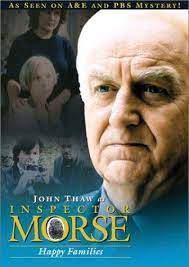
HAPPY FAMILIES
UK, 1992, 100 minutes, Colour.
John Thaw, Kevin Whately, Martin Clunes, Anna Massey, Alun Armstrong.
Directed by Adrian Shergold.
Happy Families is, as always, an interesting Inspector Morse story. While the setting is Oxford, there is nothing particularly Oxford about the plot.
Morse is his usual self, although he becomes increasingly crusty as the film goes on, with the Deputy Chief in Oxford, his frustrations with solving the murders, having to attend the press conferences, the taunts from the journalists, the photos and the articles. Lewis is a long-suffering.
The solution of the mystery seems to be part of the business interests of the allegedly happy family. In fact, it is not, quite another facet of the family concerning the mother, Emily (Anna Massey) and her affair long since. Also involved is Emily’s close friend, a psychiatrist,
In the supporting cast are actors who became much more famous afterwards including Alun Armstrong, Rupert Graves as well as Martin Clunes.
This episode was written by Danny Boyle, later to be a distinguished director with such films as Train spotting and an Oscar for Slumdog Millionaire.
- The popularity of the long-running series? Television movies? With style? The popularity of Morse and his personality, enigmatic and mannered style? The personality of Lewis? Their relationship? The solving of the crimes? Intricacy of the plot? The psychological dimensions, the mystery and clues? Police work and solving the mysteries with their own abilities? The work of Colin Dexter?
- The Oxford settings, the city and landscapes, the cityscapes, the buildings? Comments about Oxford and Oxford society? The ironies about Oxford and the dons? The university city? Ordinary people? Their interconnections? So much beauty – and so much crime?
- The quality of the mysteries, character-driven? Sufficient information, sufficient clues? The exploration of character and clues?
- John Thaw as Morse, his personality, the changes over the years, yet remaining the same? The mystery of his name? His crusty manner, the bachelor (but romantic at times)? His own authority – exercised over Lewis – and his reaction to authorities? Promotion or not? The changing of his attitudes towards Lewis, bossing him, patronising him about education and culture? The issue of music? Drinking ale? His car? Quietly at home, at work? With Lewis, understanding the situations and characters, the deductions? His being a good listener – but critical?
- The contrast with Lewis, the family man, the ordinary policeman, education and lack of education, his being put down by Morse – but enjoying his comeuppance now and again? Music and his ignorance? The first reactions, Lewis being patient? His admiration for Morse, having to do so much leg work, to formulate hypotheses? Working under pressure? Collaborator and partner of Morse?
- The police authorities in Oxford? The medical examiners?
- The quality of the film as a crime thriller, a thriller with intelligence and demands on the audience?
- The introduction to the crime, the credits, the background in Oxford, beyond?
- The range of personalities, motives? Truth and concealment? Jealousies? Deceits and angers?
- The title? I have an ease? At the meal, the disputes, business interests, Emily and her lack of business interest, the relationships, harshness, deaths?
- The death of the father, in the kitchen, the made binding him, Harry? Reactions? Harry and his walk, his death? James, the spade, his death? The suspects and motives?
- Morse as usual, but will crusty, and with Lewis, with the suspects, with the new commander, with the journalists, the press conferences, his reaction to the articles? The interviews? Is not knowing until he read the book?
- Lewis is rather long-suffering, his work, the footwork?
- The temporary chief, his reputation, the press conferences, wanting to be there, yet ousting Morse, then giving him the credit?
- The coroner and the detailed information? The maid, information?
- Emily’s friend, bringing Jessica, with Emily, talking with Morse, the care, helping Jessica, her work as a psychologist, writing the book, the machine for detecting things in the ground? The irony of the evidence of the pen and her buying it in Montréal?
- The lawyer, the type, the information, the complexities of the business interests, his love for Emily?
- The expert from Eastern Europe and his opinions? James and his double deals, against the rules of the company?
- The journalist and the photographer, critical of Morse, getting his photo at home, the articles?
- Harry, the fall, the insertion of the screw? James, the spade? Morse and his wanting to dig up the area, finding the weapon, the link to masonry work?
- Emily, with the young girl, thinking it was her daughter, even though the daughter had died at birth, her being killed by the girl? Morse and the others too late to stop the deaths? The background of Emily’s affair, with the stonemason, the family murdering and burying him?
